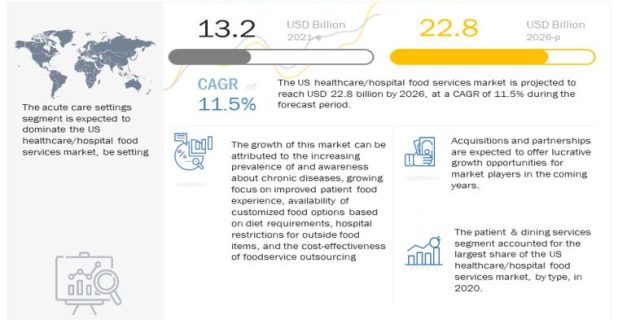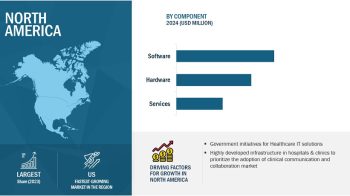
This report aims to provide detailed insights into the global healthcare food services market. It provides valuable information on the type, procedure, application, and region in the market. Furthermore, the information for these segments, by region, is also presented in this report. Leading players in the hospital food services market are profiled to study their product offerings and understand the strategies undertaken by them to be competitive in this market.
Revenue Growth Analysis:
The US healthcare food services market is projected to reach USD 22.8 billion by 2026 from USD 13.2 billion in 2021, at a CAGR of 11.5%
Download PDF Brochure:
https://www.marketsandmarkets.com/pdfdownloadNew.asp?id=170935372
Key Factors Driving Healthcare Food Services Market Growth:
The growth of hospital food services market is mainly attributed to the increasing prevalence of and awareness about chronic diseases, growing focus on improved patient food experience, availability of customized food options based on diet requirements, hospital restrictions for outside food items, and the cost-effectiveness of foodservice outsourcing.
Healthcare Food Services Market Drivers:
Increasing prevalence of and awareness about chronic diseases:
Good nutrition is an integral component of patient care. Not only does eating correctly provide substantial physical benefits, but it also ensures psychological comfort throughout hospital admission. The World Health Organization termed 2016 to 2025 as the ‘United Nations decade of action on nutrition.’ The collective acknowledgment of the concept of ‘food as medicine’ has driven the focus on nutrition and dietetics both inside and outside the healthcare sector.
Poor diets lead to chronic illnesses such as heart disease, Type II diabetes, and obesity. Foods obtained at work are generally high in calories, sodium, solid fat, added sugars, and refined grains. Also, American diets are generally poor in nutritional quality and do not align with the dietary guidelines for Americans. Urbanization, changing lifestyles, and changing trends toward ready-to-eat food (junk food) have led to an increase in the prevalence of chronic diseases, such as cardiovascular disease (CVD), neurological disorders, cancer, diabetes, chronic respiratory diseases, renal disorders, and digestive diseases. Almost half of the total chronic deaths are attributable to cardiovascular diseases, obesity, and diabetes.
Request Sample Pages of Hospital Food Services Market:
https://www.marketsandmarkets.com/requestsampleNew.asp?id=170935372
In 2020, the acute care settings segment accounted for the largest share in the US healthcare food services market Also, this segment is estimated to grow at the highest CAGR during the forecast period. The large share and high growth of this segment can be attributed to the high number of acute hospitals, growing number of admissions in acute hospitals, treatment of a large patient pool in acute hospitals, and the growing adoption of foodservice outsourcing by hospitals to improve patient experience and reduce costs.
Key Players:
Healthcare Food Services Market are Compass Group plc (UK), Sodexo (France), Aramark (US), Elior Group (France), Healthcare Services Group, Inc. (US), ISS World (US), Culinary Services Group (US), Metz Culinary Management (US), AVI Foodsystems, Inc. (US), Thomas Cuisine (US), Hospital Housekeeping Systems (HHS) (US), Whitsons Culinary Group (US), The Nutrition Group (US), Food Management Group, Inc. (FMG) (US), and Prince Food Systems (US).
Providing comfort through food can be a challenge as many hospitalized patients are required to adhere to a strict diet. It is challenging for hospital food service market providers to practice individualized nutritional care due to the complexity of the patients’ nutritional problems and constraints in the way of nutritional care to a large number of patients. Healthcare professionals and healthcare foodservice providers describe providing nutritional care to older patients as challenging because nutritional problems are often multifactorial and complex. It has been observed that physical, psychological, and social issues like dental problems, dysphagia, addiction, dementia, depression, and loneliness can affect the appetites of patients and their ability and willingness to eat.

